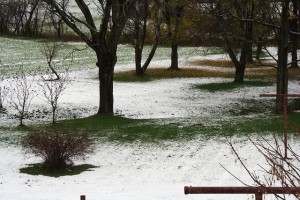 Mulching, as any gardener should know, is the act of spreading or laying materials over the surface of the soil around plants to act as a protective cover. Mulching helps retain soil moisture, keeps weeds down, and wards off heat and cold. As they decompose, organic mulches such as shredded or chipped bark, grass clippings, composted manure and straw fertilize the soil.
Mulching, as any gardener should know, is the act of spreading or laying materials over the surface of the soil around plants to act as a protective cover. Mulching helps retain soil moisture, keeps weeds down, and wards off heat and cold. As they decompose, organic mulches such as shredded or chipped bark, grass clippings, composted manure and straw fertilize the soil.
In the fall, after the leaves have fallen from the trees, savvy gardeners will begin to prepare for winter mulching. The amount of mulching material you spread around each plant and the timing is dictated by the climate belt you are in. Severe cold areas require a heavier mulching layer than more moderate areas. If in doubt as to what your plants need and when in the way of mulching for the coming winter, consulate your local mulch distributor or gardening supply store at the end of the summer growing season.
In snow-areas, cold-weather mulching protects perennial plants in much the same way as a heavy blanket of snow insulates the ground in winter. Trees and dormant bulbs need the same insulating protection.
Be aware of mulching too early. Let the first winter moisture and frost penetrate the soil before applying your layers of mulch. By keeping the frost in and regulated at a steady temperature, the ground soil won’t expend and contract due to temperature swings and “heave” or push the plants up out of the ground. In addition, if plants or bulbs freeze and then thaw and then freeze and thaw, the roots can get damaged if they are exposed to the cold.
Another benefit of spreading winter mulch around the base of plants is to insulate the roots and keep them cold and dormant. If trees are suddenly exposed to a warm spell in the winter, and the roots aren’t protected by mulch, the tree can begin a false budding process that could damage or even kill the tree. Bulbs plants like tulips are also subject to premature budding, or sprouting, without a proper mulch coating on the ground.
When spring does arrive, and plants begin to sprout and bloom, a layer of mulching material will help keep the spring weeds down. And any spring rains that are absorbed into the soil before you mulch for the summer months will be better retained because of the remaining coat of winter mulch.
As you work the remnants of the winter mulch into the ground, remember that today’s mulch is the soil conditioner of tomorrow, a savings not only in cost but also in time. A local Milwaukee mulch company has experts that can answer any other questions that you might have. Call 414-856-9077 to find out more.
See also “Undercover Gardening: Mulching Your Garden for Winter“
Photo by Mark from Flickr using Creative Commons license.